
The World Health Organization (WHO) has revealed that over one million children in Ghana, Kenya and Malawi have received one or more doses of the world’s first vaccine for malaria.
A new pilot programme coordinated by the WHO has resulted in over one million African children receiving a dose of a groundbreaking vaccine for malaria. The pilot launched in April 2019 by the Government of Malawi has shown that the RTS,S/AS01 (RTS,S) vaccine for malaria is safe and feasible to deliver and substantially reduces deadly severe malaria.
These findings allowed WHO to make the historic October 2021 recommendation for the expanded use of RTS,S among children living in settings with moderate to high malaria transmission. If this vaccine for malaria is widely deployed, WHO estimates that the vaccine could save the lives of an additional 40,000 to 80,000 African children each year.
Securing funding from Gavi, the Vaccine Alliance
It is reported that $155m has been secured from Gavi, the Vaccine Alliance, to support the introduction, procurement and delivery of this vaccine for malaria for Gavi-eligible countries in sub-Saharan Africa.
“As a malaria researcher in my early career, I dreamed of the day we would have an effective vaccine against this devastating disease,” said Dr Tedros Adhanom Ghebreyesus, WHO Director-General. “This vaccine is not just a scientific breakthrough, it’s life-changing for families across Africa. It demonstrates the power of science and innovation for health. Even so, there is an urgent need to develop more and better tools to save lives and drive progress towards a malaria-free world.”
New candidate vaccine for malaria and other exciting innovations
WHO has stated that they welcome progress in the development of R21/Matrix-M and other malaria vaccine candidates in early clinical development. The successful competition of clinical trials for these vaccines is vital to assess their safety and efficacy. Furthermore, they noted that they welcome the exciting news from BioNTech, which aim to develop a vaccine for malaria using mRNA technology, which can be found in the Pfizer-BioNTech COVID-19 vaccine.
In vector control, several new tools and technologies have been submitted to WHO for evaluation. If they demonstrate efficacy in controlling the disease, WHO has stated that they will formulate new recommendations or amend existing ones to support their deployment. Innovations submitted include new types of insecticide-treated nets, spatial mosquito repellents, gene-drive approaches and sugar baits designed to attract and kill Anopheles mosquitoes.
WHO have also welcomed the recent approval by the Australian Therapeutic Goods Administration of dispersible tablets of single-dose tafenoquine for the prevention of P. vivax malaria among children. Tafenoquine has also been approved for use in adults by the US Federal Drug Administration and by drug regulatory bodies in other countries, including Brazil, Peru and Thailand. As a single dose, tafenoquine is expected to support patient adherence to treatment. The current standard of care requires a 7- or 14-day course of medication.
Several other antimalarial medicines with new modes of action are being developed for the treatment of uncomplicated and severe malaria. Ganaplacide-Lumefantrine, currently in Phase II clinical trial, is the first non-artemisinin combination therapy and could be an asset in the fight against emerging drug-resistant malaria in Africa.

























